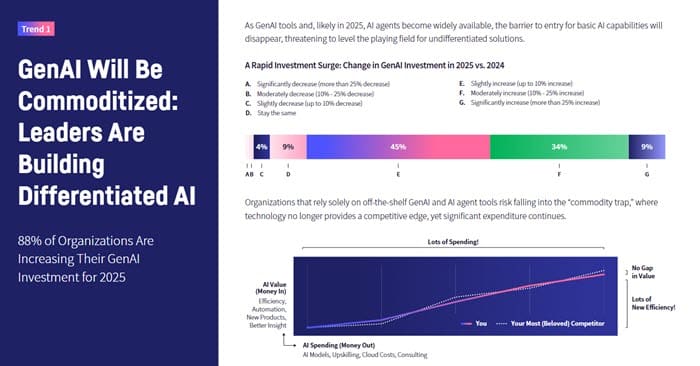A new report from Dataiku outlines some key GenAI trends we will see in 2025.
Companies are racing to adapt as artificial intelligence moves beyond basic automation into autonomous decision-making, with Gartner predicting that by 2028, AI agents will make at least 15% of day-to-day decisions autonomously, up from zero today.

A comprehensive survey of data, analytics and IT executives reveals that 66% of organisations have invested over $1m in generative AI initiatives in the past 12 months, while 81% of C-suite executives report moderate to high trust in GenAI usage. However, this rapid adoption comes with significant challenges in measuring returns and managing risks.
The research, conducted across 400 technology leaders and 200 C-suite executives, found that 88% of organisations are planning to increase their GenAI investment in 2025, despite ongoing concerns about governance and return on investment. A striking 72% of data and IT executives report positive ROI from their GenAI projects currently in production.
Organisations are increasingly adopting multiple AI models, with 73% taking a hybrid approach to large language models (LLMs). Of those using multiple LLMs, 60% are managing between two and three models, while 40% are juggling four or more. This complexity has led to 79% of executives implementing secure gateways for LLM access.
The governance challenge is particularly acute, with 75% of C-suite executives expressing serious concerns about data privacy breaches. Despite these worries, 36% still believe the benefits of widespread GenAI adoption outweigh the risks. Notably, 63% are very or most concerned about compliance with regulations and legal liabilities.
The talent implications are significant, with 93% of C-suite executives considering it “very or critically important” for employees to understand, work with, and generate insights from data. Companies are responding with comprehensive upskilling initiatives – 78% are promoting continuous learning through knowledge-sharing sessions, while 65% are encouraging hands-on projects with GenAI technologies.
However, the survey indicates potential blind spots at the top. Nearly half (47%) of C-suite executives believe GenAI will have more impact on operational efficiency than breakthrough innovation, suggesting leadership may be underestimating the technology’s transformative potential.
The findings also highlight a growing “commodity trap” risk, where basic AI capabilities become standardised across industries. Companies are responding by focusing on differentiated AI applications – 66% of organisations are implementing strict governance policies to ensure their GenAI applications meet data privacy, regulatory, and quality standards.
Looking ahead, the research suggests that organizations failing to develop sophisticated AI capabilities risk falling behind more agile competitors. With 28% of data and IT executives ranking data security, privacy, and compliance as their biggest technical challenge with GenAI, the next phase of AI adoption will require careful balancing of innovation and risk management.
The message is clear: while GenAI adoption is accelerating, success will depend on organizations’ ability to move beyond basic implementation to develop differentiated capabilities while managing an increasingly complex landscape of models, risks, and governance requirements.

